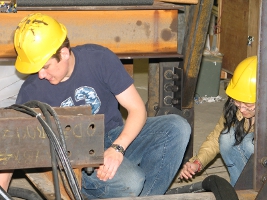What is Civil Engineering?
What Do Civil Engineers Do?
Civil Engineers design, construct, and maintain society’s infrastructure which includes the highways, buildings, and water systems we use daily. A few areas in which civil engineers work include: construction management; groundwater contamination; transportation design and planning; design, construction, and monitoring of waste containment facilities; disaster prevention; river mechanics and stream restoration; earthquake engineering; flood prediction, forecasting, and control; community development; surveying and mapping; and wind engineering. The infrastructure of the United States is deteriorating and in need of repair. Civil Engineers will be called upon to do this.
Civil Engineers employ scientific principles to serve society. Many Civil Engineers work internationally to improve the quality of life throughout the world as there is a huge need. For example: 1.1 billion people worldwide live without safe drinking water, 2.6 billion people do not have adequate sanitation, and 3.4 million people die annually from water-related diseases. One student organization, Engineers Without Borders, is trying to help in one small way to improve the quality of life in third world countries. See video: CSU EWB in El Salvador. Civil Engineers apply modern tools such as global positioning systems (GPS) and geographic information systems (GIS) to solve problems related to water resources, transportation, or structures. They use information technology to protect infrastructure from natural hazards or terrorist threats.
How Can You Become an Engineering Student?
In high school, focus on academic courses emphasizing English, mathematics, sciences, social studies, and complete:
- Four units of English including reading, composition, grammar, literature, and speech.
- One unit each of algebra I, geometry, algebra II, and one-half unit of trigonometry/precalculus.
- One unit each of chemistry or physics and natural science (including laboratory work).
- Two units of social science and one additional unit of either natural or social science.
- Three units of academic electives (can include foreign language).
You will also need to develop good study habits and strong time management skills.
As a Civil Engineering Student, You Will:
- Participate in freshman and senior design projects, allowing you to apply multiple tools to solve engineering problems.
- Understand the impact that a Civil Engineer has on society.
- Have opportunities to get involved with active student organizations.
- Work with outstanding faculty members who conduct strong research programs, bringing new knowledge to your classes.

During Your First Year, You Will:
- Take mathematics and science courses to build a foundation for future civil engineering courses.
- Learn how to apply important concepts to engineering problems in the introductory civil courses.
- Practice writing and speaking clearly in composition and arts and humanities courses.
- Explore Fort Collins and discover some of its great recreational and cultural opportunities.
Frequently asked questions and answers for students considering enrollment in the Department of Civil and Environmental Engineering.
